“Wars will begin where you will, but they do not end where you please.”
Niccolò Machiavelli
‘Within the soul of each Vietnam veteran there is probably something that says “Bad war, good soldier.’
Max Cleland
After years of the security the university provided it was time for my graduating cohort to go out into the real world and find paid work. Some of us newly minted had jobs to go to while others had to face up to the requirements of the labour market.
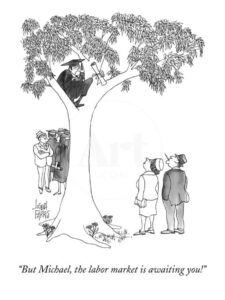
Feeling a deep-seated conviction something important was struggling to get out, this bachelor went in for teaching, working in two country high schools in NSW where I cut my professional wisdom teeth.
I found it challenging getting teenagers how to pay attention in class. I felt like the latest of Elizabeth Taylor’s husbands. I knew what I was supposed to do, but I didn’t quite know how to make it interesting.
I really wanted to live in the city but you had to go where the Department of Education directed you , which was fair enough – this was the way that schools in less popular areas were staffed. While Condobolin was a town like Gunnedah but smaller and drier, getting my feet wet at the high school went smoothly.
‘Can I give you a lift home?’ asked the principal of the first high school I was appointed to.
‘It’s only a few blocks,’ I answered.
‘It’s not the distance. It’s the company.’
Larry Houlahan was driving me to my home from a school meeting at Condobolin High in late January when we heard the breaking news on his car radio. Gasping, taking in breath, He slammed on the anchors, throwing me to the floor.
‘What in hell! Is my hearing going? How could this be possible? Whatever happened to our conquering heroes? We’ve been led to believe their grasp on South Vietnam was unshakeable. We’ve been told that we’re winning the war against a bunch of peasants, and now they’ve taken over the American Embassy. ’
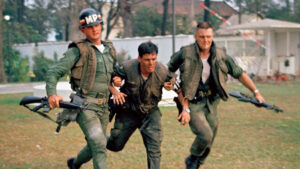
‘Like it or not, Mr. Houlahan, we live in interesting times and they sure are a changing’
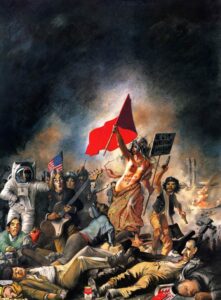
was all I could say.
‘This hasn’t escaped the attention of even the policy makers. They say the situation in Vietnam has become very ‘fluid’. ’
‘In other words ‘chaotic’. And hopeless. Our trumpets are sounding taps, not reveilles. Being in this war is like Alcoholics Anonymous. Step one is admitting you have a problem. Well, we have a problem. So do our countrymen. Thanks to our problem, now all of the world has a problem, to wit: a major lost campaign and a war gone awry. ’
‘Not surprisingly few countries want to share this problem. The Americans banked on the idea that they’d get backing from their European allies but this has never eventuated. Johnson put a great deal of pressure on Erhard for the Federal Republic of Germany to contribute to the war effort.
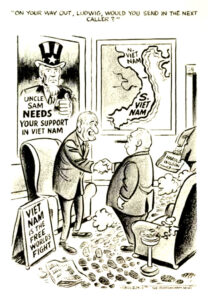
The conflict became a burden and an impediment to German foreign policy goals. Many Germans were concerned that Erhard’s unwavering support for Johnson would threaten it’s co-operation with the French who wanted a Europe independent of the super powers. When Erhard stayed at the LBJ ranch they felt this relationship had become too cosy and that Johnson’s rosy accounts of American invincibility were no more than fairy tales.
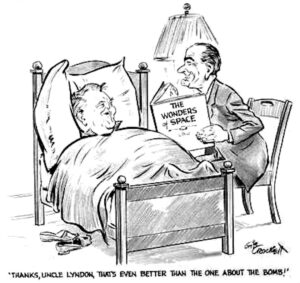
There was a huge disconnect between the policies promulgated by the Empire and the reality on the ground.
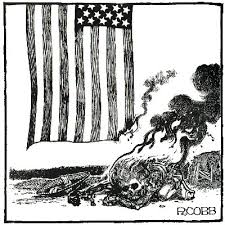
On that February day in that axial year 1968, the news that jolted us and the world was of the fighting in the grounds of the U. S. Embassy in Saigon. The term ‘secure area’ no longer had any meaning.
That fighting was part of The Tet offensive, the opening shot in which the U. S. ruling class and its allies around the world faced the greatest challenges to its rule in a generation. Like an earthquake that spawns a thousand aftershocks, this was an upheaval with consequences.
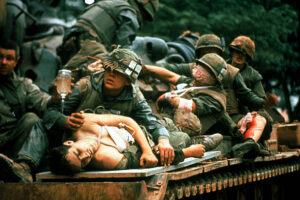
It made the homegrown ‘Brinks Job’ look like a tiny tremor. With the war literally coming into our homes every night, things had gone from bad to worse there. In February every major American military base, caught off guard, was attacked in unison and overwhelmed. This multipronged attack not only caught US forces by thunderclap surprise but brought to our domestic hearths almost unbelievable television pictures of US marines fighting within the grounds of their own embassy in Saigon to prevent its being overrun by the Vietcong. In response, Westmoreland led a successful campaign which resulted in heavy losses on the side of the N. L. F.
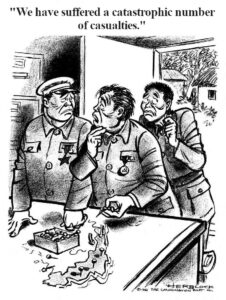
Despite this, it did not break their will.
The Tet offensive was a military defeat for the Viet Cong, who never recovered from the losses they suffered.
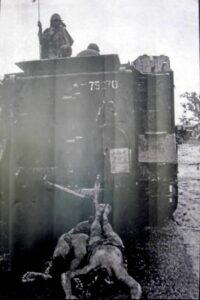
However, it was also a propaganda victory from which the United States was unable to recover.
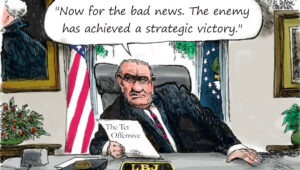
Westmoreland’s blindly optimistic reports about the war’s course were discredited by North Vietnam’s ability to mount such a large-scale campaign. It only increased the number of people from different backgrounds who were willing to fight to the finish for independence.
It proved that the NLF had an inexhaustible supply of men and women that were willing to fight to overthrow the imperialist backed government.
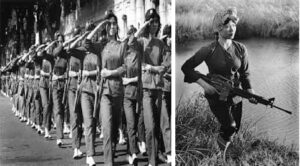

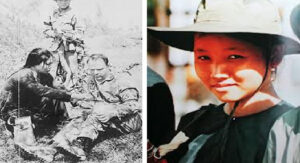
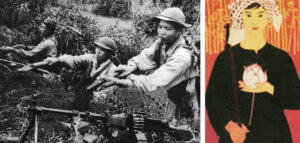

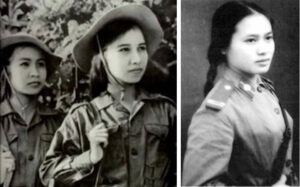
Johnson’s great setback enabled the sinisterly posturing Nixon, the “law and order” candidate in the upcoming election, to get the drop on everybody. It forced the hand of rivals in his own Democratic camp, ready to exploit growing disenchantment with the runaway war.
VIETNAM MESSAGE
We will take our corrugated steel
out of the land of thatched huts.
We will take our tanks
out of the land of the water buffalo.
We will take our napalm and flame throwers
out of the land that scarcely knows the use of matches.
We will take our helicopters
out of the land of colored birds and butterflies.
We will give back your villages and fields
your small and willing women.
We will leave you your small joys
and smaller troubles.
We will trust you to your gods,
some blind, some many-handed.
The ‘Diffident’ Dissident.
“If you think the war is being conducted with skill and wisdom then there’s no need for change,” Rod Serling declared in his familiar Twilight Zone voice. “If you agree that we can do better, then vote for Senator Eugene McCarthy.”
Millions of young Americans were getting ready to do just that. In late October 1967, tens of thousands of them came to the Pentagon calling for an end to the war. As in Australia many young men burned their conscription notices.
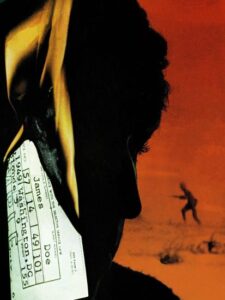
Declaring his candidacy for the democratic leadership in November ,1967, the professorial senator Eugene McCarthy, one of Minnesota’s favourite sons, had taken his political life in his hands, climbing out of the trenches to take on Johnson on an anti-war platform.
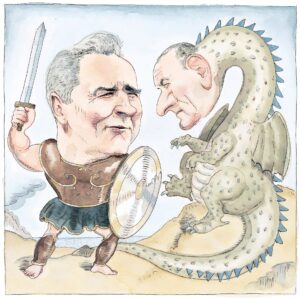
He had first rode into town with a bold executive strategy of achieving civil rights legislation and anti-poverty acts. These had created great electoral debate, gained him media attention and high approval ratings.
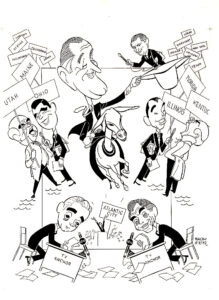 Now all the goodwill he had earned with the public had permanently evaporated. The master compromiser could not compromise a war ten thousand miles away.
Now all the goodwill he had earned with the public had permanently evaporated. The master compromiser could not compromise a war ten thousand miles away.
In September Dean Rusk had made a speech in which he said that the United States would need to build a wall of men around China, and to that end, the U. S. would have to send an additional five hundred thousand soldiers to Asia. Commenting on Rusk’s remarks, Eugene said that if the President didn’t repudiate Rusk and his statement, this matter should be taken to the country.
Having voted in 1964 for the Tonkin Gulf resolution, his decision to bring it on was partly an outcome of Wayne Morse’s stand. When McCarthy and Senator Morse wanted a debate on the Vietnam War in 1967, only three other Senators would have their back. There was no pleading on this issue due to Johnson’s tactics. Working in the dark, under the table, by private, often secret negotiations, this personification of Foghorn Leghorn fulmination bulldozed his critics .
Gene said: “Party unity is not a sufficient excuse for silence.” He said: “We do not need presidents who are bigger than the country, but rather ones who speak for it and support it.” There had to be a challenge ‘ to control the presidency of the United States of America.”
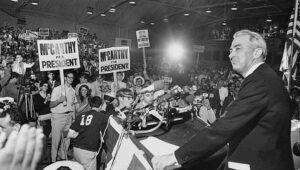
It was decided that for there to be a national debate on the war, one of the gadflies would have to run against Johnson for President. Delusionally, L. B. J. had actually portrayed himself as a peace candidate.
True he had met with Soviet Premier Kosygin the previous year. They discussed in good spirit the most pressing issues threatening world peace such as the Middle East conflict that divided them.
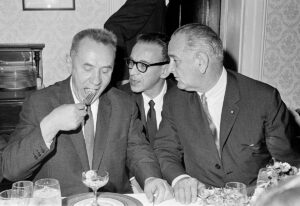
At the same time his country was still bogged down in it’s brutal war against North Vietnam.
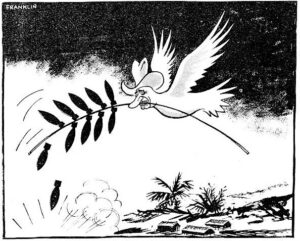
He saw himself as the man who could battle the Cold War while all over it domestically.
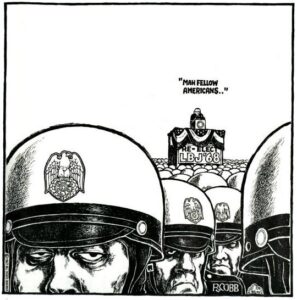
Talking from two sides of his mouth, he felt as did many did that his accomplishments in the field of civil rights outweighed the damage he had done to the nation carrying on the war . But it was too late in the day. Even his most trusted adviser Clark Clifford couldn’t put him back on his pedestal again.
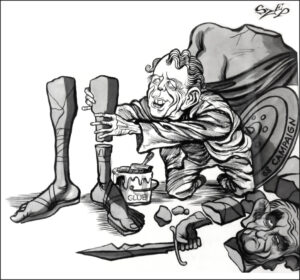
With Bobby Kennedy in the middle of his long Hyannis Hamlet routine, refusing to oppose Johnson, the job fell to Eugene. He declared: ‘My decision to challenge the President’s position and the administration’s position has been strengthened by recent announcements out of the administration….. The evident intention to escalate and to intensify the war in Vietnam, and on the other hand, the absence of any positive indication or suggestion for a compromise or for a negotiated political settlement.”
“I am concerned that the Administration seems to have set no limit to the price it is willing to pay for a military victory. ’
“Involvement in Vietnam,” McCarthy concluded, “was no accident. It did not happen overnight. It was a direct result of America’s conception of itself as the world’s judge and the world’s policeman.”
In formulating this opinion he had the benefit of William Fulbright’s counsel.
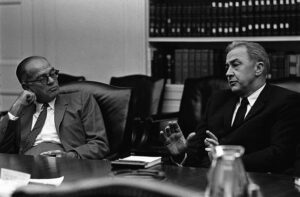
Daughter Mary was also instrumental in convincing him to run by arguing that “The calling of a Christian is not to judge the world, but to save it.” He believed that government should operate on a high moral plane in service to the people, He wanted to copy his hero Thomas More, the English statesman forced to make a kind of individual and personal choice at a time when there was great upheaval. He wanted to make a stand against authority for a just cause and write his name into history.
In one lightning flash he had diagnosed the national exhaustion that driving into a bloody blind alley brings and proved that anti-war fervour could change voters’ minds.
One for the Books.
“At the risk of seeming ridiculous, let me say that the true revolutionary is guided by a great feeling of love. It is impossible to think of a genuine revolutionary lacking this quality.”
Ernesto “Che” Guevara
Keen to find books by and on the Senator, I dropped in on Bookshop Bob’s own new Sydney outlet for books soon after the Senator and Robert Kennedy began locking horns over the nomination. ‘The Third World Bookshop’ had a mesmerising depth and range of titles in stock.
A sign out front said it specialized in hard to find records. I found out why. None were in alphabetic order.
‘Please excuse our antiquated furniture, ’said Bob. ‘I’ve only got myshelf to blame.’
Not shy about its politics, proudly identifying itself with the labour movement, the shop’s literature on display represented socialist and dissident thought in the round. Losing oneself in this selection, a stones throw from Central Station-and the U. S. Consulate- even a cursory browse was absorbing enough to make you miss your train.
Bob asked me, ‘So you’re keen on books about the third world revolution. Have you been reading much in this area?’
‘I’m tearing into everything good I can get my hands on- as much at least as the next man. ’
I was the only customer bar one. The other browser was a bruiser. When he found the book he was looking for, he took it over to the counter, handed over the money, then proceeded smugly to tear the pages to pieces and rip the spine off in front of Bob.
‘Can I get you anything else?’asked Bob
‘You can get yourself out of the book business and report back to Ivan. ’ Then the joker stormed out.
‘If I never see him again, that would be too soon,’ Bob said in farewell.
‘Who the hell is this inner brawler? I asked’
‘He’s ‘the next man’. Now I’m fully aware this writer’s not to everyone’s liking but I’ve never seen this response to him’, said Bob.
‘Who’s that, ’I asked.
‘Che Guevara. ’
‘Most American politicians can’t seem to act rationally when it comes to thinking about Cuba.’
‘Or Vietnam at the other end of the alphabet, ’I said, ‘and all the ones between’, I replied.
‘What is little known is that Eugene McCarthy met with Che Guevara in New York City in 1964, ’ Bookshop Bob’ informed me, under the stare of the Argentine revolutionary, one of a variety of posters for sale pinned to the wall of his new bookshop. ‘In a Park Avenue apartment. ’
‘Another one of Bernstein’s hosted soirees?’ I suggested.
‘No’, said, leaving aside his sorting out a wonderful jumble to engage in discussion with me. ‘Something even more serious. An informal back channel meeting set up hugger mugger by journalist, Lisa Howard. ’
‘It sounds an intriguing episode, worthy of a spy novel, ’I said.
‘Have a look at this, ’ he said, handing me a copy of the the journal, War and Peace Report, dated May 1963, ’and you’ll appreciate the takeaway. ’
Upon reading these, I realised Lisa’s apartment had become command central, communications central, for phone calls and messages between Cuba and the United States. She wrote that in eight hours of private conversations Fidel Castro had shown that he had a strong desire for negotiations with the United States: “In our conversations he made it quite clear that he was ready to discuss: the Soviet personnel and military hardware on Cuban soil; compensation for expropriated American lands and investments; the question of Cuba as what some call ‘a barracuda base for Communist subversion throughout the Hemisphere, or as others say is a ‘revolutionary focal point.” This was not the incorrigable megalomanic ‘son of a bitch’ the former backers of the former strongman were always raving on about.
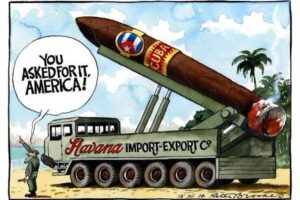
‘Why hadn’t details of this rendezvous been made more publicized? I asked. ‘What do you think they talked about, ‘this courtly New Deal liberal and Fidel’s closest confidante?’
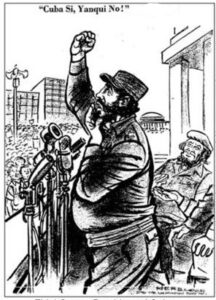
‘ By all accounts, and these are sketchy, they discussed the U. S. and Cuba making amends. The Cuban leadership was anxious to talk about restoring ties to the U. S., cut off after their high stakes missiles contest with it’s bad beats and downswings.
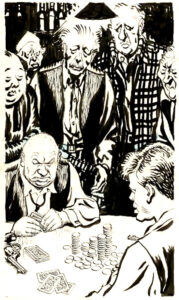
‘They would have been interested in resuming trade with the U.S. and gaining U. S. recognition of the Cuban regime, ‘I said.
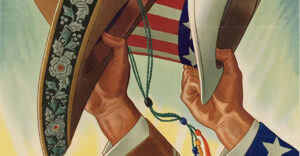
‘What with the state of the Cuban economy, they need to obtain convertible currency. Further, any dealings with the U. S. would add respectability to the regime in the eyes of other Latin American States.”
‘Do such attempts at secret negotiating happen often?’
There’s a list of dialogue and covert-overt, informal-formal overtures by various intermediaries since the Cuban revolution.
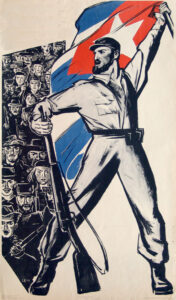
Kennedy sent a New York lawyer to win the liberation of the Bay of Pigs prisoners, over a thousand prisoners and their families. Since then there’s been talk around a whole range of issues that affect close neighbours, like migration, counter narcotics and Coast Guard cooperation. ’Why do Presidents use such methods rather than going through normal channels?
‘The political issues around talking to this government it doesn’t technically recognise are so sensitive that Presidents feel they have to use intermediaries, private emissaries and envoys, many of whom are not actually tied to the U. S. government in any way, to bring messages back and forth. In part they don’t entirely trust the layers of bureaucracy, and they don’t the information filtered, so they send an emissary that they feel they have personal confidence in. And also, it’s less likely to leak than if you go through the regular bureaucracy, where there are always people opposed to your policy who are willing to leak it to Congress or to the press. Moreover you can’t negotiate some of these tough issues in public, because of the kinds of compromises that have to be made. ’
‘Yet McCarthy’s back channeling involvement hasn’t had any appreciable effect. Relations are not yet normal. Why is this, Bob?’
‘Well you may ask. The American administration feared a backlash from the strong anti-Castro lobby domestically. It feared relations with other countries in Latin America might take a hit. There was suspicion throughout Latin America that the U. S. might make a deal with Cuba behind the backs of the other American states. This could provide a propaganda line useful to the Communists.”
‘ So with or without U.S. relations, Che continued training revolutionaries. ’
‘He felt that this was a necessary mission for the Cuban government since he saw socialist revolution offering the only hope of human progress for Latin America.”
‘Regrettably the U. S. response has only been to maintain it’s hostilities with Fidel’s government, I said. ‘And execute Che in Bolivia, after he was captured in battle , courtesy of their CIA agents.’
‘‘And pursue their endless hare-brained schemes to assassinate Castro, I said.’
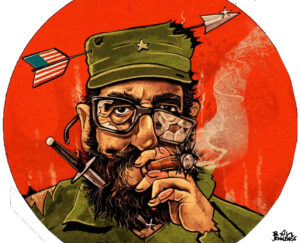
‘Executive action’ is the name they go by.’
‘So much for any U. S. moral high ground!’ I said. ‘Bob, a big section of young people are looking for figures like Che who they can identify with in their opposition to the oligarchs and imperialist figures who run the world. His enemies accuse Che of committing the same crimes as his enemies. How say you ?’
‘Che’s record speaks for itself. He was a military leader in a guerrilla rebellion, ’Bob said, ‘ and like any military leader in a war he shot spies and deserters, agonised about it, and discussed it publicly.’
I’m sure in other circumstances he would have tried to win over any of those captured to the revolutionary cause. That’s essential to winning a guerrilla war. But revolution is no dinner party as has been said and the exigencies of the moment meant all prisoners couldn’t be processed properly. A small hard pressed guerrilla force couldn’t afford to carry any number of prisoners with them. Still his critics say he killed people with glee even after winning the peace.’
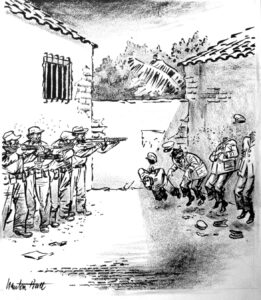
‘He was a Galahad, not a Robespierre, ‘said Bob, referring to the Stalin of the French Revolution.
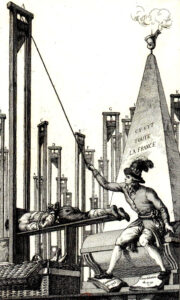
The musical accompaniment of the struggle was Chopin’s Revolutionary Etude. The spirit of Garibaldi hanging over it, it was permeated with naïve hopefulness and humanitarian faith’
That romantic ethos of the Sierra Maestra has had to contend with the dictates of realpolitik, hasn’t it.’
‘Latin exiles who have come to Cuba for support already complain that there has been a palpable cooling off of revolutionary ardour. Like the Polish Jacobins come fruitlessly for aid to revolutionary Paris, they feel that the interests of the new state in the international order has begun to blur revolutionary fraternity. For the revolution, as for the church, the world is full of snares and pitfalls: the unavoidable minimum of intercourse with things-as-they-are, the need for trade to earn one’s bread, the necessity for some diplomatic relations, and the logic of statecraft which demands weapons, technology, compromise and duplicity. With the assumption of temporal power, the Revolution, like the Church, enters into a state of sin.’
We can only hope that this revolution will not go the way of the Russian experiment.’
Let’s not forget that the focus of Che’s political concern was not Moscow but his America — from the Mexican sierra to the Argentine pampas.
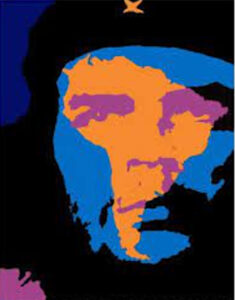
He thought in continental and internationalist terms. He was not a Cuban and could not be satisfied with building freedom from Yanqui Imperialism in one Latin country only. The slow erosion of pristine virtue Che felt creeping into the new revolutionary state motivated him to embark on a wider mission.’’
‘Your analogy of the fate of the Church is fascinating. Looking like a Sunday-school print of Jesus, there’s a religious quality to him, don’t you think, Bob?’
‘In a sense he was, like some early saint, taking refuge in the desert. Only there could the purity of the faith be safeguarded from the unregenerate revisionism of human nature.’
Hopefully his legacy will be for Cuba to avoid the monstrous sins that were committed under Stalinism. To create a society Something more like that of Yugoslavia.’
‘Che saw the Castro regime as the Titoism of the Caribbean.’
‘ Or as the Nasserism of Latin America.’
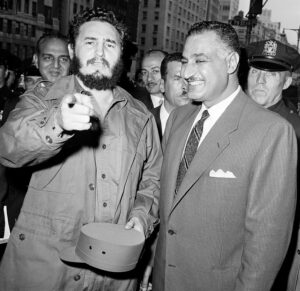
‘This is also very true. Domestically, both Nasser and Castro were faced with the same challenges: how to achieve national independence, industrialization and striving for the modernization of society . Eventually, both had to resort to the same radical options. They grabbed Moscow’s support and relied on ideological mobilization to defend the revolution from foreign intervention.
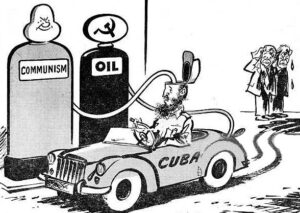
As well they aimed at increasing productivity, land reform and the expropriation of old elites.
‘That’s what those like that iconoclastic pillock just here find hard to take. If you read Che’s side of things in this book, and think about that clown’s reptilian brain, you’ll understand how Che ended up like this. ’he said, dropping the pieces of pages into the waste basket. ’ With that Bob walked from behind his desk, over to the other side of this booklover’s aladdin’s cave, plucked a fresh copy from the shelf, and handed it to me. It was Che’s manual ,Guerilla War.
‘This little book on guerrilla war has become a bible for revolutionaries.’
‘For anyone interested in the story of Che Guevara, ’said Bob, ‘and in the idea that a small group of determined men and women can topple and replace a brutal reactionary regime, this book is essential reading. “
‘So too it is the anti bible of the Green Berets of Fort Bragg.’
‘That’s where John F. Kennedy initiated the training of Special Forces as the Janissaries of the counter-revolution.’
‘His attempt to repeat his success in Bolivia was ill-fated. ’
‘Che’s political judgments were sometimes mistaken, but by any standards he’s a towering moral figure. ’
‘To what do you attribute his appeal?’, I asked.
‘One part of his appeal to idealistic youth is that he put his own body on the line. How many political leaders have won a revolution, been for several years a leading figure in another country’s new government and then voluntarily gone off to other awesome fronts in other countries?’
‘He has been accused of being an egotistical political adventurer, ’I said.
‘His tactical sense may have been overwhelmed by romanticism. However no one can doubt the courage of his attempt. His memory will long resonate with the youth of the world, particularly in Latin America, where he is identified with the other major figure in Latin American history. He and Simon Bolivar are two of a kind. ’
‘What say you about Eugene’s tilt for office, Bob? The U. S. is as Brecht would have it, an unhappy land that could use some heroes today. Can he help liberate us and our allies from this crazy war machine? Can he find the chink in Johnson’s armour? ’
‘ That’s an open question, Allan. he’s scared The Big Texan stiff by articulating a principled opposition to the war although LBJ diehards kiss him off as a mere “footnote in history”.
‘They’ve missed the point. One footnote can do immense damage. It appears he doesn’t mind whose toes he steps on. All those big feet may turn out to have feet of clay. ’
‘Well, he’s corralled enough idealists to turn vexation into votes. LBJ’s especially worried that Eugene will get Dr. King’s backing. But in running, he’s spurred Bobby Kennedy into throwing his hat into the ring too. ’‘
‘‘Now they’re squaring off as rivals in the brutal primary battles. It looks like a photo finish. What do you see as their differences, Bob?’
‘ Unfortunately these are defined less by a real joint effort to bring home the half-million Americans fighting in Vietnam than by what they see as pleasing and appeasing their constituency. Those who don’t know why America is the Land of Promise should be there during an election campaign.
Norman Mailer proposed this unity in a huddle with Bobby, a swing and miss to broker a detente between the two Irish Catholic Americans. ’
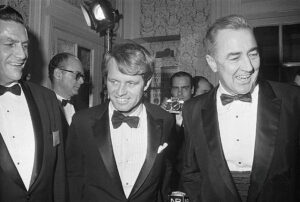
‘’Tis a pity this didn’t succeed’, I said. ’
‘We won’t ever find a candidate whose ideas and approach accord completely with ours or who appeals initially to a large majority. We have to work with the best we’ve got. ’
‘We must work harder at getting to a consensus so we don’t lose or come so close to losing means having candidates moving “to the centre”. You’d assume that the Catholic Kennedys would have embraced Gene. After all two heads are better than one to figure things out..”
‘Regretfully there’s a strong personal animus in relations between Gene and Bobby. The question had even arisen as to who was the most Catholic, Gene or the Kennedy brothers. The high-minded sardonic senator resents the fact that Bobby, having ruled himself out of the race, let him do the “dirty work” of challenging Johnson. Only once it was apparent the big Texan was vulnerable did he enter to unhorse him.
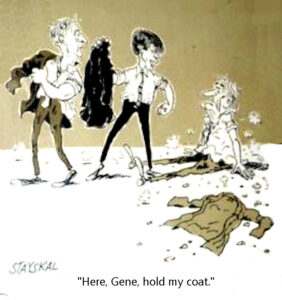
He sees Bobby as equivocating on Vietnam and an opportunist both for bigfooting him and for jumping into the race belatedly.
He has accused Bobby of ‘poisoning the well’ in his utterances. In turn Bobby sees Eugene as a spoiler who should have stepped aside for him once he was ready. ’
He originally had nothing but good things to say about him, didn’t he.’
‘He vaunted Gene for making ‘citizen participation a new and powerful force in our political life’.
‘How do they differ in the way they go about things?’
‘Eugene resents the opportunistic, tubthumping hardball Kennedy style, he himself being cool, laconic and sharpwitted. Tall, dignified, well tailored and poised, he certainly looks presidential. On Capitol Hill his nickname is ‘The Needle’, in honour of his wicked wit. When a voter lamented having to choose between Johnson and Nixon, McCarthy readily sympathised. “I know,” he said. “That’s like choosing between vulgarity and obscenity, isn’t it?”’ After Governor George Romney, the Michigan Republican, said that briefers in Vietnam had “brainwashed” him, Eugene said that ‘surely a light rinse would have sufficed. ’
‘Can you give an idea of how these qualities carry over into his campaigning?’
‘ Eugene gives the impression he doesn’t want to win that badly, that he would rather be right than be President. He says “Of all the people running I’m probably the one who least would like the presidency.” He can appear petulant, aloof, very private, allowing laconically that he is at least “willing” to be president and, yes, might even be an “adequate” one. Not what some might call a battle cry.’
‘You know what he likes least about being a public figure?’
‘What’s that?’
‘The public. While he trumpeted his anti-Vietnam politics ten and twenty times a day at factory gates, coffee parties, schools and churches, on the streets, and on the air, he wasn’t up with the larks. Aides reportedly asked him on one occasion if he would like to meet the workers at one factory’s gate at 6am? “I’m not really a morning person,” he replied.
‘That shouldn’t rule him out, ’I said. ‘Some fare better rising early, others later.The early bird gets the worm.
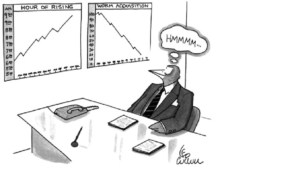 The early worm… gets eaten.’
The early worm… gets eaten.’
‘And the second mouse gets the cheese. In what other ways does Eugene appear distant?’’
‘He looks embarrassed when he sticks out his hand to say to a stranger, “Hi, I’m Gene McCarthy.” While his civil rights record is considered exemplary, when asked about the issue at a rally, he reportedly advised his questioner to look up his record.
“Record, hell! Tell us what you feel!” the citizen shot back at the candidate.
Known back in Minnesota as ‘Thomas Aquinas in a suit”, this ascetic, private person by nature can be often found on retreat in a monastery.
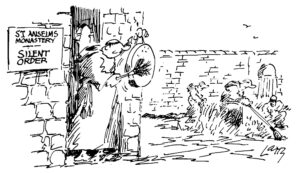
He even trained for a year in an abbey to become a monk. He and his fellow noviciates were shut off from the outside world.
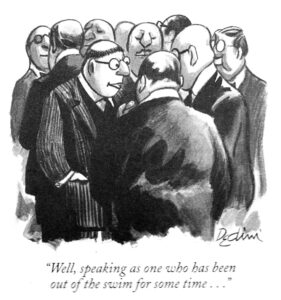
Eugene was ejected after a year for ‘intellectual pride’, a failing for which he is frequently put down . ’‘A failing he’s probably very proud of, I’m sure. He once remarked that no man could be equipped for the presidency if he has never been tempted by one of the seven cardinal sins. ’
‘ He prefers to confer with the poet Robert Lowell than with pundits. Lowell has declared him, “A one-man Greek Chorus. He’s very blunt, unable to conceal his boredom with fund-raising, with his disenchantment with some of his fellow Democrats. Some say he lacks that fire in his belly. The rap on Gene is that he’s too thoughtful to be president. While he says his aim is to stop the war, he believes the war is the consequence of undemocratic rule. He likes to quote Plutarch, the ancient Greek historian: “They are wrong who think that politics is like an ocean voyage or military campaign, something to be done with some particular end in view.”
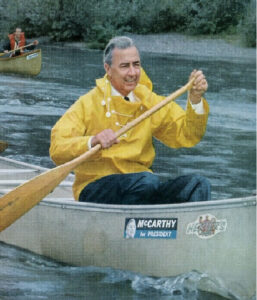
‘He’s making his stand for a style more than a cause. ’
‘Some say He puts his own personality, his conception of himself, at the centre of the campaign, instead of the issues he symbolises to hopeful supporters. This private sensibility is rooted in Catholic school thought.
How do you interpret this?’
‘Like Arthur Calwell Gene believes Christians have to decide where they stand when it comes to killing people. Whether they’re hanging on the cross or banging in the nails.’
‘ And he has a temperamentally conservative view of the dynamics of change. ’
‘He seems manifestly uneasy with the enthusiasms he has evoked. ’
‘He’s uncomfortable with all the personal adulation. On the stump, some say he seems like flat champagne – he has the right flavour but not enough fizz. Some people find this reserve a limitation while others admire his single plain speaking, promising no new deals or frontiers, and lack of hunger for more power. He saw himself as a benedictine. They want to expand their minds to envision a more ideal world not run by an ongoing series of spectres, but by our better nature. ’
He’s very down to earth expressing a “down home” philosophy. He wants to uphold the dignity of the presidential office while reducing the pomposity and imperial distance that now affect it. He’s given his word to take down the fence around the White House and have picnics on the lawn. He wants to take the rose garden out of this pre-eminent example of public housing and replace it with humble vegetables like cabbage and squash. He says: ‘You’d have trouble announcing war in a cabbage patch.’
‘How do you explain such an introspective, enigmatic candidate who keeps a low profile emerging to prominence?’
‘In the current campaign, Gene, like all the candidates have been forced to become something more than they intended. He’s been swept along by the force of the campaign, finding himself having to take positions on controversial issues beyond the war. Some of his following tend to read themselves into a condition they ‘need’ and hence see him as more radical than he is.
‘People are looking for almost any candidate who’s saying almost anything different about the war, ’I said. ‘To those who knock him for not grandstanding his emotions in the conventional way of so many politicians, I say let them stand up and lead themselves. ’
‘ Well, by chasing the sitting president out of the race, this rare bird has won the intellectuals, the professionals, and the young, serving up politics and poetry, theology and baseball in a blend that entrances the legions who flock to his call. ’
‘I can imagine he would have a lot to talk about with Dr. Castro,” I said, having learned of the Cuban leader’s Jesuit schooling and love of baseball. ‘However I think Fidel would have to be dragged to a silent retreat. ’
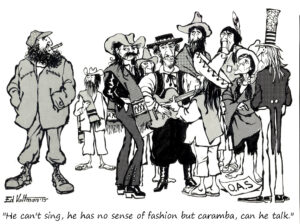
‘Undoubtedly he would subject Gene to a marathon speech about ending Cuban isolation throughout the Latin Americas. Gene would be amenable to this as most citizens within the Organisation of American States favour integration.’
‘Gene would prove his match when it comes to oratory. He often wraps up his campaign rallies with loud requests from his student volunteers that he read some of his own works. He’s only to happy to oblige, standing up in front of his audience like so. ’said Bob, with his hands in his jacket pockets, rocking back on his heels and orating.
‘Many activists from the action faction insist it’s a waste of time working to stop the war from inside the system, arguing doing away with it for a new one. They seek to draw attention grabbing protests to their discontent from the media, covering only that which fill the airwaves and column inches, generate ratings and sell advertising minutes . ’
‘As long as it is controlled and directed responsibly, this is much more mature youthful behaviour than the flagpole sitting, phone booth stuffing, car cramming,
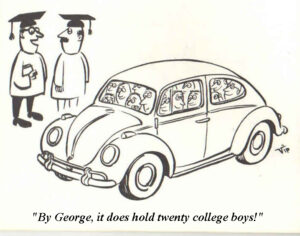
goldfish eating and panty raids on campus
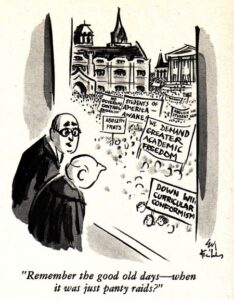
that grabbed public attention just several years ago.
’‘Allan, it has lead to the following question coming to the fore: ‘Is it more effective to lead mass rallies and actions such as occupations and hunger strikes, or to play a smaller role in a larger, more institutionalised campaign?’
‘ All relevant outlets for anti-war expression are valuable and must be connected and co-ordinated. Our campaign is no more than the people in it. We have to straddle the line between them. Sectarianism is a must to avoid. At all costs. Gene’s seeking to use the electoral process as a means to bring an end to the war and this must be encouraged despite the limitations. “The Children’s Crusade”, as it’s been dubbed, with him ‘The Pied Piper, ’is working long hours a day canvassing to swing voters behind his candidacy. Portraying him as a political lifebelt of decency and hope in an ocean of greed, selfishness and violence. Youth from across the length and breadth of the States go everywhere, pulling the undecided off their fences. They tramp the snows of New Hampshire, rimmed with ice, their teeth chattering, some of them too young to vote, ringing doorbells. Sleeping in the homes of other supporters, school gymnasiums and church basements these three dog nights, on every square foot of cold rough floor surface, they get by eating doughnuts and coffee and peanut butter sandwiches. ’
‘With or without jelly they’re driving Johnson to the idea that he has to get out of the race – that he can’t win. ’
‘This is the reality. He can’t hit the pavement, can’t move around the country to campaign because of the protests, ’I said, ‘and the strain is showing on his face increasingly.’
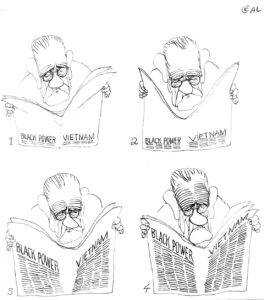
‘He had his shot at winning the war and can’t get back on top.’
‘As Theodore Roosevelt’s daughter, Alice, said after Dewey’s failed presidential bid in 1948: “Any woman knows you can’t make a souffle rise twice.”
‘Thousands of the young have distanced themselves from their more self indulgent contemporaries, helping the peace movement gain currency with a larger segment of the so called silent majority.
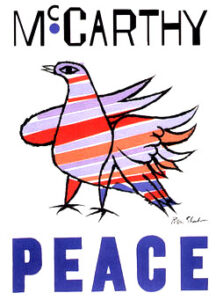
No more`tuning in, turning on and dropping out’.’
‘More turning up, trying out and dropping in’, I said.
‘The women are discarding their mini-skirts for more conventional dresses. The scruffy guys are ironing their shirts and giving their sandals a rest. They’re shaving their beards and chopping their sideburns and long locks, vowing to get well scrubbed: “Clean for Gene”.
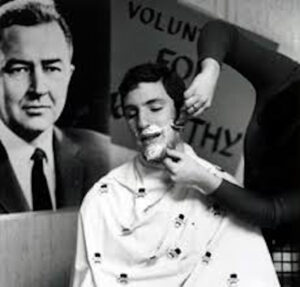
‘That’ll win over their oldies at least, ’I said.
‘As never before there’s no daylight between politics and culture. The cauldron of social issues and political unrest throughout the country, coupled with this offering of hopeful candidates has brought both older and newer members of the Hollywood and the arts community into the political process like never before.’
‘I like the way women activists are promoting an idea that has been around for millennia, Bob. They are urging their sisters to withheld their affections from men in the hope they will reject the war. That’s a great incentive.’
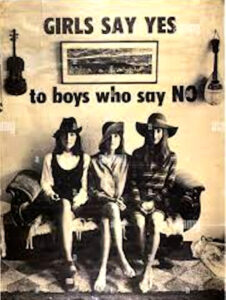
‘Hopefully that will make men think twice about going off to war. Hopefully all this imaginative input will help Gene win the election. In no other election have so many actors, singers, writers, poets, artists, professional athletes and assorted other celebrities signed up, given out and turned on for the candidates. There’s a roll call of them in today’s paper. ’
‘Who are some of them?’ I asked.
‘There’s actor Eli Wallach for starters. “He’s the man who expresses discontent with dignity,” says Eli of McCarthy . You’ll have seen Eli in The Good, the Bad and the Ugly. ’
‘Tuco the “ugly” one. ’
‘I wasn’t aware Eli was politically involved.’
‘He isn’t, but being an film actor in the US taught him to be wary. And working with Robert Vaughn on ‘The Magnificent Seven’ would’ve raised his consciousness. Fortunately for Eli by the time his career in film took off, the anti-communist blacklist was becoming less effective, and by the time of his big film appearances early this decade, it had been broken. He may have benefited from the fact that the blacklist was not as extensive or effective in the theatre as in Hollywood. He later told an interviewer that blacklisting was “in the air” at the time. “We’d sit down to read through a script, break for lunch and come back, and there’d be three people missing.”
Eli had first-hand knowledge of the witch-hunt, however, though he rarely if ever discussed it publicly. His brother Sam, a public school teacher in New York, had joined the Communist Party in the 1930s and became the leader of the CP-influenced Teachers Union. Sam Wallach was among the first eight New York teachers fired in the McCarthy-era witch-hunt, in 1951.
‘If Eli learned to show caution about the possible problems of being involved politically, this would have lessened his ability to draw large numbers to the Eugene bandwagon, I guess.’
His biggest draw-card is Paul Newman. Paul, the extraordinarily good-looking one, with eyes a remarkable shade of bright blue.’
.’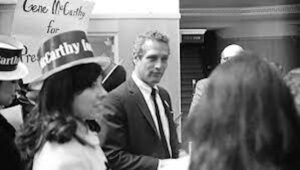
At one of his appearances to talk Gene up, Paul explained from a tailgate of station wagon: “I am not a public speaker. I am not a politician. I’m not here because I’m an actor. I’m here because I’ve got six kids. I don’t want it written on my gravestone, ‘He was not part of his times. ’ The times are too critical to be dissenting in your own bathroom.”
‘Dustin Hoffman and singing duo Simon and Garfunkel are also making appearances for Gene . ’
‘I just saw Dustin’s film, The Graduate. Listening to ‘The Sound Of Silence’ on the soundtrack, I couldn’t help thinking it was as if it were the theme written for Gene’s campaign. ’
‘In what way, Allan?’
‘The lines made me think of the genesis of Gene’s dream: ‘Because a vision softly creeping, left its seeds while I was sleeping, and the vision that was planted in my brain still remains within the sound of silence. ’
‘What do you think the silence refers to?
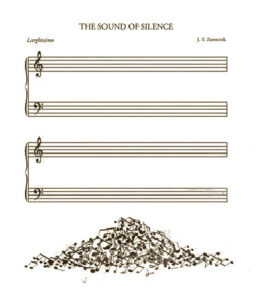
‘Is it the still of the monastery night? Tell me your interpretation. ’
‘I think it refers to submission in general. How people foolishly follow rulers without actually knowing a ruler’s true intentions and background. “People hearing without listening” reveals a people’s willingness to take heed of the commands spoken by a leader without fully realizing the consequences of this obedience. Simon, Gene or whoever is having this dream, tries to warn these conformists in the lines that read “‘Fools’ said I, “You do not know, silence like a cancer grows. Hear my words that I might teach you, take my arms that I might reach you.”
‘It doesn’t work out that way, does it?’
“Alas his warning is swallowed in the abyss of capitulation: “But my words like silent raindrops fell, and echoed in the wells of silence.”
‘Unheard by the sleeping giant, nurtured by the cathode ray nipple, said Bob. ’
‘You got it. “And the people bowed and prayed to the neon god they made.”’
‘Let me tell you some more of the rest of the cast in Gene’s production. It’s bigger than Ben Hur. ’ Bob proceeded to read out the list reported in that day’s Sydney Morning Herald: ‘ Joanne Woodward, Lauren Bacall, Robert Vaughn, Myrna Loy, Alan Arkin, Melvyn Douglas, Woody Allen, Carl Reiner, Barbra Streisand, Jill St. John, Dinah Shore, Darren McGavin, Eva Marie Saint, Burt Lancaster, Alan Jay Lerner, Dick Van Dyke, Mary Tyler Moore, Leonard Nemoy, Phil Ochs, Peter, Paul and Mary to name a few, have also lined up behind Gene. Bette Davis is serving as hostess for some of his functions. Robert Ryan, critic of McCarthyism, famous for his roles as cynical, prejudiced, violent characters, embraced pacifist ideals and Gene’s cause.
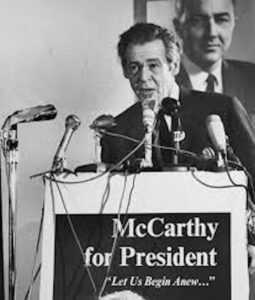
‘What about writers, ’ I asked.
‘There’s the author William Styron. ’
‘He knows the importance of choice, ’I said, aware of that he had set up for Sophie.
‘There’s Robert Lowell and Arthur Miller. ’
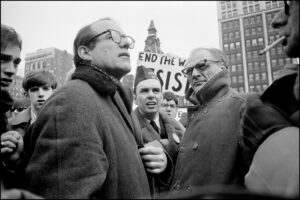
‘ Both I remember a few years ago turned down their invites to a White House function. They refused to come. Arthur Miller sent a telegram to the White House: “When the guns boom, the arts die.”
‘ I believe those now attending today’s White House functions play a new parlour game. ’
‘What’s that? ’asked Bob.
‘Guess who’s not coming to dinner, ’I replied. ‘ Now I’ve got a question for you, Bob. ‘How do all these what the cold warriors refer to as ‘ungrateful’ worthies’ affect this campaign?’
‘They transfer the star power that Gene lacks. They voice radio ads, making campaign appearances and raise his visibility. Some of the famous names also participate in “Eugene cabarets”– fundraising, entertainment, and other heavyweight gatherings held in New York, San Francisco, and other cities using an admission price to raise money to send Gene on his way. ’
‘Funding shouldn’t be but is perhaps the biggest issue in mounting a campaign in the U. S. ’
“When you have a candidate who is not so well known, and there’s only chicken feed for television time, these well-known drawing cards are indispensable. Hollywood and politics are intersecting in an increasing number of ways, especially in the packaging of candidates. Hollywood techniques are fast becoming political techniques. ’
‘ The stars are aligned against war. Bobby’s got his own lineup of luminaries as well, hasn’t he. ’
‘ He’s a celebrity in his own right. He can count on even more well-known actors and entertainers who share his views. After he announced his candidacy in March , his campaign has been deluged with offers of help from Hollywood – some one hundred actors, directors and producers called offering their support. His enlistment of the Hollywood elite builds on his long family ties to the entertainment industry. This is a unique tactical alliance between California’s exorbitantly wealthy celebrity class, and some of the poorest, most dispossessed people of the state. It helps craft the image that he might restore to the White House- some of the glamour of Camelot.”
Who are some of the Hollywood and celebrity supporters working for him to get out the votes?
‘The list of ‘magic flutes’ is long. Otto Preminger, Mahalia Jackson, Sidney Poitier, Janet Leigh, Shelley Winters, Marlene Dietrich, Rita Hayworth, Kim Novak, Milton Berle, Henry Mancini, Warren Beatty, Bill Cosby, Tony Curtis, Bobby Darin, Henry Fonda, Jack Lemon, Shirley MacLaine, Melina Mercouri, Nancy Wilson, Gene Kelly, Jack Lemon, Gregory Peck, Lesley Gore, Patty Duke and Rod Steiger, Filmmaker John Frankenheimer directs and produces ads for him.
Bobby also has a number of professional athletes helping his race. Rafer Johnson, the 1960 Olympic gold medalist, heads an “Athlete’s for Kennedy” committee and often accompanies Kennedy on his tours through black communities.
And in a blow to Gene, some of his early Hollywood supporters, such as Lauren Bacall, Kirk Douglas, Sammy Davis Jr., Candice Bergen, Rosemary Clooney, Andy Williams and the rock ‘n roll group, Jefferson Airplane, have now broken for Bobby. Andy Williams, Bobby’s skiing companion is also a stand up guy. Williams told a New York Times reporter: “I’m doing it because I think it important. I am worried about the image of America. People don’t think Nixon is swell, and they don’t think Humphrey is swell. Bobby has star quality.” Williams is refurbishing his guest house for use by the Kennedy family. He is chairing the “Hollywood for Kennedy” committee and has rounded up a star-studded group, including including the aforementioned plus Henry Fonda, Gene Kelly, Shirley MacLaine, Eddie Fisher, Perry Como and Sidney Poitier. ’
‘What about Robert Vaughn?
He often speaks publicly against this war and others. “In our fervour to halt the potential spread of totalitarianism, what incredible precedent are we setting in Vietnam?” he asked in an impassioned speech. “By marching our legions through the countryside of foreign continents, burning homes, laying waste to the land and indiscriminately killing friend and foe alike?
Robert has long supported the Kennedys. It was John F. Kennedy who inspired political interests in Vaughn. Robert made speeches for him back in 1960. He quite visibly identifies with the martyred President. On top of his desk rests a portrait inscribed by the late leader. He’s a close friend of Bobby so you can guess who he’s backing.’
‘Gene’s got Robert Vaughn behind him, I believe.’
‘Vaughnie beat others to the punch having a go at Johnson over the war – and he did so very publicly in a January 1966 speech. In Indianapolis, at a dinner given to support Johnson’s re-election, he spoke out against the war and Johnson’s policy there.
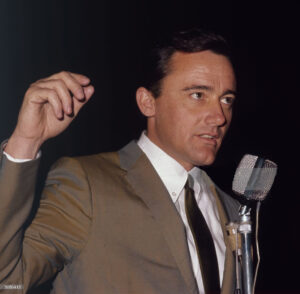
Everyone at the front table had hands over their eyes,”
‘He didn’t rush into taking this stance, did he?’
‘With a doctorate in Communications behind him, Robert has some truly thoughtful things to say about life and politics. He had given the policy lots of consideration.
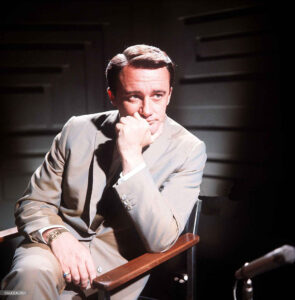
Robert thoroughly researched the topic, a process that included digging through everything he could find from the library, requesting and receiving information from the State Department, and visiting wounded soldiers — and concluded that he was adamantly against American action in the country.
He had been deeply influenced by MLK.
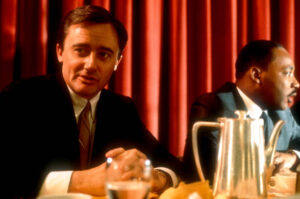
Martin had delivered his powerful and angry ‘Beyond Vietnam’ speech in which he opposed the four scourges driving the war in Vietnam: poverty, racism, imperialism and militarism.
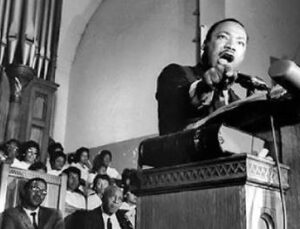
His putting two and two together earned him a great deal of condemnation and pushback for his movement. However it was completely consistent with his nature and character. It was something he needed to say. Martin understood very clearly that what Americans ought to be doing at home is being distracted by their engagement around the world. He couldn’t say to young folks who were being denied, that they should engage nonviolence as a philosophy when he saw pictures of these Vietnamese children being bombed and the impact that napalm was having on their bodies.
He couldn’t tell tell young black men, who are being denied right there in the streets of America, that they should offer themselves up and to sign themselves up to go to do harm to people around the world who they do not know.
Martin marched at a huge rally in New York City afterwards.’
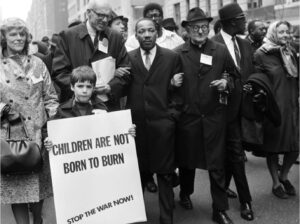
‘That he did. Some days after the speech.’
‘So Martin exerted a strong influence on both Eugene and Vaughnie. In that speech he elaborated on the mistakes that he forecast could destroy the nation.’
“I can talk for six hours about the mistakes we have made,” ‘Vaughnie’ told one reporter in two years ago. “We have absolutely no reason on earth to be in Vietnam-legal, political or moral,” he said of this bloody blockbuster.
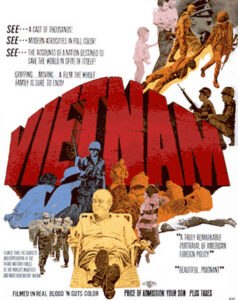
Robert debated conservative icon William F. Buckley Jr. about the war on the program ‘Firing Line’.
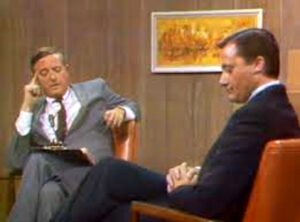
It was an often heated episode. Robert more than held his own against Buckley, reducing Buckley to stammers and stutters. He was so relaxed, none of Buckley’s pot shots getting through.
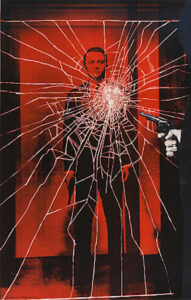
At the start, Robert spat out names and dates like a computer. Curled up in a ball, Buckley clutched his clip board for dear life as his adversary shot back.
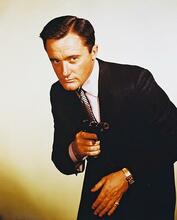
‘Robert’s actions have earned him death threats. But he remains undeterred.’
His actions, he learned later, would earn him a six-year investigation by the FBI, which suspected him of communist activities.
‘I expect he might be not be present at any more special fund and consciousness raising performances. I’ve seen some of the televised elaborate galas. You’d think many might be wary of political activism, being mindful of the anti-Communist witch-hunts that terrorized actors, producers, musicians, and others, wrecking careers and ruining lives. ’
‘That was then. This is now’, said Bob. The U. S. is a nation fired to boiling point. The war has become a goading factor for many in Hollywood. The bodies are delivered back to the small towns in canvas bags inside reusable aluminum containers. They’re delivered on average every half hour of the day. People are not going to be cowed any more. Too many folk talk out, buoyed by the support of others. As Robert Vaughn told the media after a lengthy meeting with Wayne Morse he had nothing but encouragement from my friends in the industry, from the studio, even the network. There’s little standing on the sidelines. People from all walks of life are taking sides. ’
‘The stars obviously feel it’s not risky to be so outspoken?’ I said.
‘ Lest it be forgetten, Hollywood and the arts community have a long history of political activism and endorsement of presidential candidates. Some like singer Pete Seeger, have never stopped their activism, even in the face of political pressure. They represented activism at its most contagious because it was always linked to celebration and joy. With the civil rights movement in particular, a new wave of actors and singers such as Joan Baez, Harry Belefonte, Marlon Brando, Bob Dylan, Charlton Heston, Sidney Poitier, Paul Newman and others became involved in one way or another. Some lent their name or provided financial support; others joined marches and demonstrations.
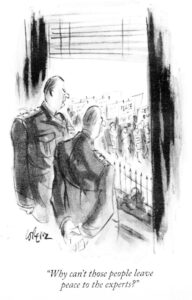
Even in the dark and dour days of the 1950s there was a sizeable swath of Hollywood backing Democrat Adlai Stevenson for his Presidential bids of 1952 . And in the 1960 election of Jack Kennedy, there was notable support from Frank Sinatra and friends, as well as Kennedy family connections to Hollywood. ’
” Kennedy inherits the Camelot aura, doesn’t he. You can see this when he is driven to his rallies in a motorcade. He stands in his car like a rock star, hair tousled, grinning toothily, h supported by an arm around his waist, leaning over the screaming crowd that rush in to touch his hand, to reach for his hair and face. Gene must find that hard to compete with. ’
‘ He does. While Each political candidate is seeking the help of Hollywood stars and other famous names to advance their respective campaigns, Bobby seems better placed than Gene. He’s within shooting distance of the nomination. ’
‘Yes, ’I said with a knowing look, ‘ that is a cruel metaphor but regrettably apt. What do you think is the impact of celebrities on election outcomes?
‘The involvement of these famous and well favoured faces definitely is a factor and does affect the course of events. At the same time many doubt their ability to sway voters. Glamorous is as glamorous does. It will be be instructional to see how Gene and Bobby fare compared to Johnson’s man Hubert Humphrey now he’s heading for Chicago.
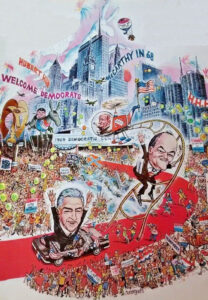
He rather than Bobby has got Sinatra’s backing now.
‘How did Bobby lose Sinatra?’ I asked.
‘As Attorney General, Bobby initiated some actions against the Las Vegas gambling scene where Sinatra had friends and interests.
‘Who else can Humphrey rely on?’
‘He’s gathered on his list some of the older and more established Hollywood names, sports stars, and other leading names, including actress Tallulah Bankhead, opera star Roberta Peters, jazz singer Sarah Vaughan, former heavyweight boxing champ Jack Dempsey, writer and naturalist Joseph Wood Krutch, fashion designer Mollie Parnis and Trini Lopez. ’
‘ If I had a hammer’, I said. ‘It doesn’t sound like Trini and Co. will have the same ring as that of Gene or Bobby on the young’.
‘In being the vice President, Humphrey has the inside track. He is best placed to use the “party machine” to gather his delegates and is the favoured establishment candidate with the support of Johnson and such heavyweights as Richard Daley. ’
How do you see the odds between Bobby and Gene?’
‘Bobby attracts blue-collar, latino and black support even more widely than Gene. Not to speak of the party bosses and the smart money who see the war as lost. They think his toughness and ruthlessness can bring it home.
‘Both haves and have nots, ’I said. how can they be held like this in the one party?
‘Let’s look at the different factions. Firstly remember the Democratic party is the home of serious and genuinely Catholic politicians and voters. To the urban Irish American nurtured at the teat of corruption back in the old country, where government was harnessed to control wealth by the ruling Protestant ascendancy , government became a means to economic advancement and realizing the American dream. ’
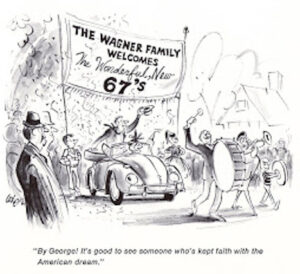
‘The reason they call it the American Dream is because you have to be asleep to believe it. ’
‘It’s a very simple hope, isn’t it. A job for many, a fortune for a chosen few. It’s not so different from the ALP, is it’.
‘Quite so. And this has brought compromises with segregationists in the Democratic Party, right?
That’s why the Democrats are generally so disappointing. That’s why their symbol is the letter ‘D’? Because it’s a grade that means good enough, but just barely. ’
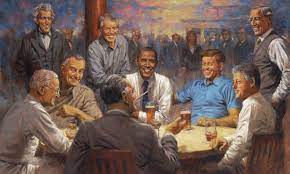
‘So how does the symbol ‘R’ work for Republicans?’
‘Because it’s the noise a pirate, Lincoln excepted, makes when he robs you and feeds you to a shark. ’
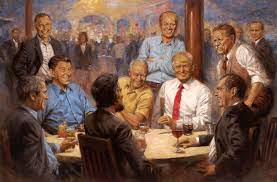
‘Who do you have in mind?’
‘Campaign contributors like those rapacious oilmen who pump so much funds into the Republican war chest.’
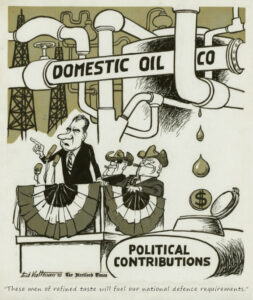
‘Republicans say they want minimal interference by government in economic affairs, don’t they. ’
‘ Yes. They are the party that says government doesn’t work and then they get elected and prove it. ’
‘And the Democrats?’
‘The Democrats are the party that says government will make you smarter, taller, richer, and remove the weeds from your lawn. ’
‘And where do the more high minded brahmans in reformist parties like the Democrats and the A. L. P. come from?’.
‘ It was the mainstream Protestant churches at the end of the 19th and beginning of the 20th Centuries who gave America its reformers, high-minded WASPs like Teddy Roosevelt and his distant cousin Franklin D. Roosevelt. You can compare them to figures like our Gough . Too rich to have to steal and too classy to want to soil their hands with graft. ’
‘So Gene is associated with this liberal progressive faction rather than with the party machine which saw the Kennedy’s allied themselves with Joseph McCarthy.
‘ As a matter of fact Gene took on ‘Tailgunner’ Joe and his alarmist warnings about the Communist menace in a head-on debate on foreign policy on national television. ’
‘Their Irishness hasn’t seem to have created much of a bond between them, has it. ’
‘Bobby sees Eugene as coming across as Lace Curtain Irish . He portrays himself as shanty Irish, like his brother well-versed in street politics, one who can get things done.. But as someone who had always banked on his youthfulness and intelligence, Bobby is bristling at losing the some of the support of the intelligentsia and college campuses. He jokes that McCarthy gets the straight “A” students, and he gets the gentlemen’s -C frat boys.
‘There’s a lot more of these, ’I said, ‘with scads of problems, the ones to whom Bobby increasingly addresses himself. That’s a large voting bloc. What are some of their policy differences?’
‘Eugene believes the North Vietnamese government is willing to negotiate, mentioning that he might travel to Paris to discuss peace with them. He believes that to forge an end to the hostilities any further bombing should be halted.
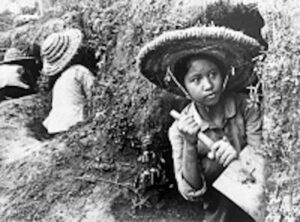
He has declared that “no nation has a right” to “destroy a nation with the rationale of “nation building.” He says that he will accept a coalition government that includes Communists in Saigon.
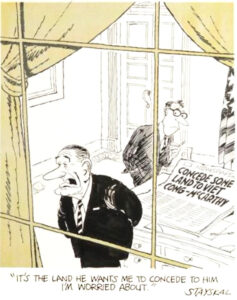
He has torn strips off the government of South Vietnam, saying that it would be “too kind” to label the entity as corrupt and a dictatorship.
‘ And domestically?
Socially he wants to implement the desperately-needed programs strangled by the ever spiralling costs of the war. On the civil rights front he believes that ‘it would take 30 to 50 years of constant action and concern to carry out all promises to the emancipated Negro who has been treated as a colonial people in America.’
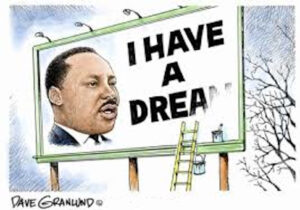
He regards the black community as one that is living in the midst of another whose citizens enjoy the good life. He believes only the relocation of inner-city blacks will solve the urban problem.
On the campaign trail, he speaks of recognizing Communist China; he calls the Cold War “a concept . . . which has outlived its usefulness,” and he has even taken on the “huge, powerful, and somewhat autonomous military establishment whose influence reaches into almost every aspect of our national life.”
He has argued for greater control of firearms. ’
‘I can imagine how all this would go down in the the W. A. S. P. heartland’, I said.
‘They accuse his thinking on the war as ‘fuzzy’ and amounting to ‘surrender.” New Hampshire’s governor-a Johnson ally has declared: ‘The people most interested in the results of this election are Ho Chi Minh and his Communist friends”. The governor claims that a big turnout for McCarthy would be “greeted with great cheers in Hanoi.” [Bobby Kennedy himself portrays Eugene as soft on communism after he said he would accept a coalition government.
‘Is there any basis for this?’
‘ Not at all. During the witch hunts, Republicans tried to challenge him as insufficiently anti-Communist but never succeeded. “I have supported the un-American activities committee and every basic piece of legislation directed to control subversive activities,” he told the press during the 1952 campaign. Accepting the conventional U. S. political wisdom, he believes the USSR is embarked on a strategy of expansion that has as its goal the control of the world.
‘Which superpower worth it’s salt doesn’t, mind you?I said, mindful of where Siberia was located.
‘While he never ran with the hounds, he fought to drive out the Communists who played a strong role in the Minnesota Farmer-Labor Party which wanted to build alliances between farmers and workers.
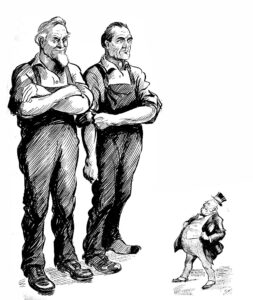
It fused with the Democrats after the war. You’ve got to remember Bobby was influenced by figures as the Cardinal of New York, rather than more progressive elements in the Church. The most important influence on McCarthy after Fulbright seems to have been anti-war Catholic writers. They drew on Pope John XXIII’s 1963 anti-war encyclical “Pacem in Terris,” in which the Pope declared, “We must obey God rather than men.” They also revived the “just war” theory, which required a proportionality between means and ends. Commonweal magazine, which McCarthy has been reading all his adult life and contributing to, has called the war “unjust,” “immoral… a crime and a sin.” When McCarthy’s mentor at St. John’s wrote in 1938 that capitalism was dying, “and should die, that didn’t mean he was advocating Communism. Rather he was recommending the back to the earth agricultural communes that Eugene became involved in. ’
‘What about Eugene’s housing diagnosis. How does Bobby see this?’
‘Supposedly more passionate in his sympathy for oppressed minorities, Bobby sees it as a scheme to bus tens of thousands of ghetto residents into white, conservative Orange County. He’s also assailed McCarthy’s previous opposition to a minimum-wage law and his allegedly weak civil rights record—enduring charges of being “ruthless” and dishonest in distorting Eugene’s record. He’s campaigning on a broader array of issues. He’s intending to make Lyndon Johnson’s “Great Society” work by raising taxes and funding anti-poverty programs being starved of liquidity by the diversion of resources to the Vietnam War. ’
‘How does Eugene respond to these appeals to the poor and minorities?’
‘Playing to his upscale base, McCarthy pours scorn on Kennedy’s ideas for improving conditions through private enterprise. Bobby wants to do this in places where people are on welfare, in the rural areas of the United States and the ghettos where there is unemployment.
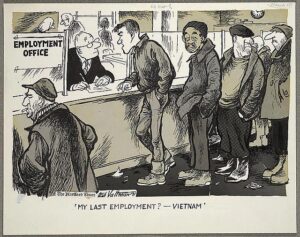
Bobby’s stated reason is ‘so that you keep people where they are at the present time.” Gene insists that large federal programmes would be necessary with public housing constructed in the suburbs where the new jobs were being created as the best way to break up racial segregation, which he called “practical apartheid.”. He refuses to see the war as a separate issue but one which must be dealt with in the configuration of problems in which it occurs.. It is within this context that he’s taking the case to the people. In turn he’s blasted Kennedy for having wiretapped King while attorney general.
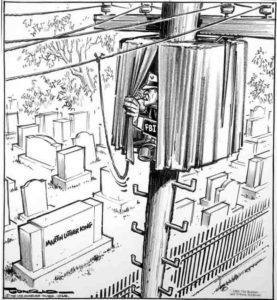 We must remember Hoover’s role as theoretically, but in practice otherwise, under Bobby’s direction. Like his brother John, Bobby has never embraced King over a long period as has L. B. J.
We must remember Hoover’s role as theoretically, but in practice otherwise, under Bobby’s direction. Like his brother John, Bobby has never embraced King over a long period as has L. B. J.
‘What is Gene’s attitude to Hoover?I asked.
He has pledged to replace him. In a speech at Indiana University Gene said the U. S. should ”re-examine the Federal Bureau of Investigation, and even reflect on who its director is.’’…
‘Unfortunately all these differences between the candidates is dividing their vote’, I said.
‘And in the process strengthening ‘Tricky Dicky’s’ hand. They need greater support. ’
‘Hopefully the Democratic Party will come out of this invigorated , live up to it’s name and carry out the reforms that it’s always promising., ’I said.
‘The danger is that the better part of the energy coming from the infusion of youth will be drained off, the movement neutralized by the boot polishing machine and diverted into ‘safe’ political channels. That’s when this new blood becomes frustrated in their desire for a real alternative, feels trapped within the party framework, the power of the smoke filled backroom, and quit politics altogether. Like our labour parties to a great extent, the Democratic Party plays a time-tested role as a political shock absorber for the ruling elite, providing an outlet for political and social tensions that might otherwise find expression in a far more radical and openly anti-capitalist form. ’
‘As for the outcome at hand, ’I said, ‘we can only trust in the good sense of the American people to bring the war to a quick end. ’
‘Don’t hold your breath. ’said Bob. For this long shot to become big shot we’ve a long road ahead, I’m afraid. How long, it remains to be seen. By the way, ’he added, ‘before you go, don’t forget to get ‘The Limits of Power’. This is Gene’s mordant critique of American foreign policy, and of the involvement in Vietnam in particular. It’s hot off the press. You can’t leave empty handed without a copy. ’
Having read it, I would congratulate this cynosure of those against war for his temerity in talking to The Cuban Minister of Industry and his presidential challenge, for which he would thank me. More power to him.
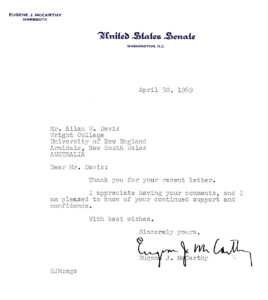
All We Are Saying
I think that people want peace so much that one of these days government had better get out of their way and let them have it.
Dwight D. Eisenhower
Bob’s forecast of the coming period was on target. The Tet Offensive demonstrated the fragility of the situation in South Vietnam, setting off a worldwide dynamic, particularly in France, former colonial master, and the U. S. The bodies of dead soldiers piling up now began to be delivered back to small towns the length and breadth of the US in canvas bags inside reusable aluminum containers on average every half hour of the day. These and other coming brutal events, all related in some way to the war in Vietnam, convinced a substantial number of political activists to embrace one form or another of revolutionary politics in order to change the world.
America the beautiful, showing long gestating scars of anger and resentment, turned its sunny 1950s façade of suburban capitalism into a powder keg of counter-culture activism and unrest for good. The very fact that soldiers, highly decorated and some mutilated and disabled, came out so furiously against the war was an important factor in changing the consciousness of the American people towards the war. Even the most evangelical previous prosecutors of the war, such as McNamara and Dean Rusk saw their own children protesting against the war which they were responsible for. Richard Rusk would say his father was, ‘an architect of a war that killed 58,000 Americans and nearly a million Vietnamese.’
In late March Johnson, scarred by operations in Indochina, announced he would abdicate.
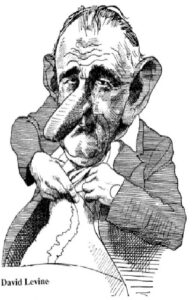
Several days later Martin Luther King Jr. was assassinated and a hundred cities rose in burning rebellion.
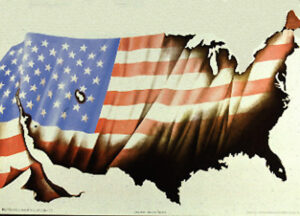
Robert Kennedy was gunned down after winning the California primary in June.
After Bobby’s assassination big names behind Bobby such as Robert Vaughn. Leonard Bernstein, Harry Belafonte and Henry Fonda came over to Eugene’s camp. With other entertainers, Vaughnie formed an anti-war wing of the Democratic Party.
Despite this, despite winning the popular vote from delegates on the convention floor wearing bands of black crepe on their arms, Gene went down to the pro-war establishment candidate Hubert Humphrey at the Democratic convention.
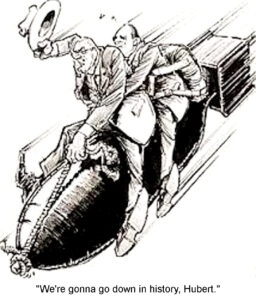
Whatever slim chance McCarthy had as the leading anti-war dove vanished when the Russian tanks rolled into Prague on August 20 .
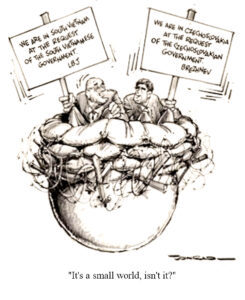
With politics become televisual a dramatic theatre piece was enacted for all of us.
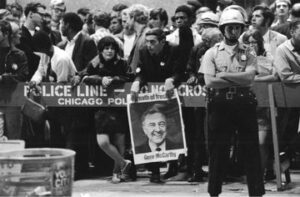
The City Of Broad Shoulders.
The historic events played out on our TV screens , bringing them home in a way that had never been possible before. Chicago shook amidst protests and an offensive by the city’s finest.
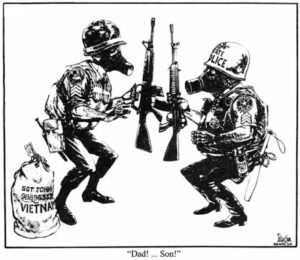
An estimated one in six protesters was an undercover agent for the police, the army or navy, or the FBI—the possibility that some of these were acting as agent provocateurs cannot be dismissed. In part the protests were driven by a handful of activists leading a force of undercover agents. Swinging their billy clubs on the streets the uniformed police beat anyone within range and not identifiably on their side to a pulp while their snarling dogs got their taste of flesh and fire hoses blasted demonstrators away.
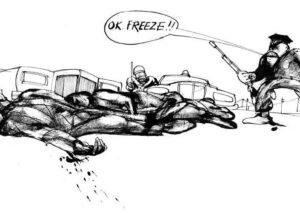
As the bruised and bleeding from the streets below the Hilton Hotel were brought to his 15th-floor volunteer headquarters, McCarthy helped aides rip the hostelry’s bed sheets for bandages. On the climactic night of the convention rampaging cops, having been issued “shoot to kill” orders, stormed McCarthy’s headquarters in the hotel, entering rooms, dragging sleeping young women from their beds, pulling them around by the hair, punching and bashing whomever they could. Four were taken to the hospital. Only when McCarthy himself came down from his room did the hammering end.
‘You can’t just come up here and knock heads, ’ he told the police. They did.
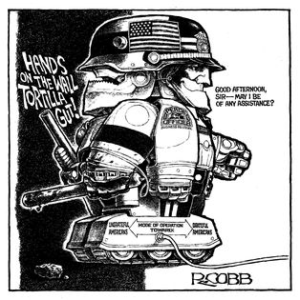
But McCarthy, aloof though he was, would not pull the pin on the young men and women to whom he owed so much. He comforted them again and hung fire his return to Washington to keep watch over them until late that day.
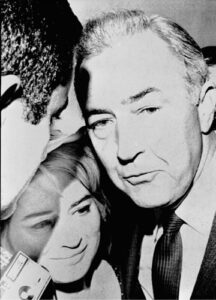
‘The whole world is watching, ’ the demonstrators below shouted, and it was easy for me and the whole world to see. Much of The violence in Sweet Home Chicago, like that in Vietnam, was played out on prime time television. We, the audience, were drawn far more intimately into the experience of unique and remote events than ever had been the case back in the day. When Mayor ‘Hizzoner’ Daley’s cops flew savagely at anti-war demonstrators, it drew the world’s attention to political repression in America.
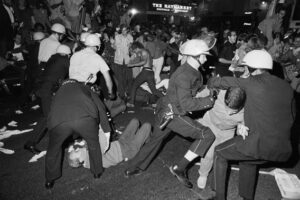
No one who was there, or who watched it on television, could escape the memory of what took place before their eyes.
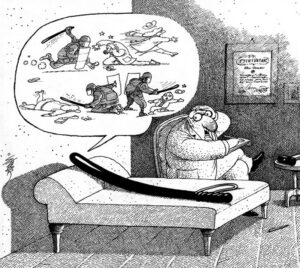
In the choice between the glamour and the hammer, the doves of peace ended up in the slammer.
The war had driven a stake into the heart of America.
It yielded no revenue.
It yielded nothing but discontent, disorder, disobedience.
Meanwhile in Vietnam itself, the U. S. military started to report major disciplinary problems with its troops that marked the beginning of a soldiers’ rebellion.
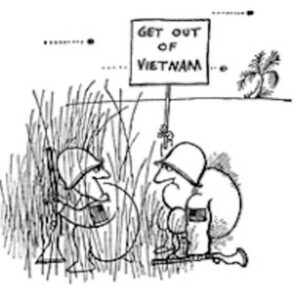
As in the larger society, a counter culture in music, fashion and values – brought on by the young – was pushing hard on convention. Drafted men increasingly deserted or openly displayed peace signs.
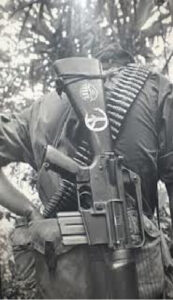
They displayed beads, long hair, insubordination and not infrequently a smouldering joint of choice ‘Laotian gold’. In a war without aim, they tended not to aim.
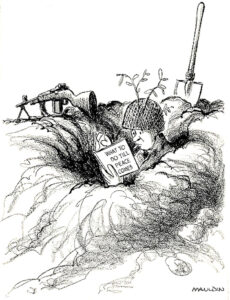
General Westmoreland having been kicked upstairs by Clifford to become Army chief of staff, would later write in his memoirs: ‘Many tried to discredit authority by fighting haircut regulations, publishing and distributing underground newspapers, sponsoring or participating in protests, trying in any way possible to ferment unrest.” Within a few years, the U. S. Army, crumbling and going to the pack, was no longer capable of waging a war on the ground. Troops, many were conscripts, were reportedly refusing to go on patrol or place themselves in dangerous situations. With ‘search and destroy’ interpreted as ‘search and evade’ , many soldiers wore red armbands as a signal to the National Liberation Front that they did not want to fight. None wished to die in a war that, to many, seemed pointless and which was clearly coming to an end. They had to be withdrawn from the hellhole.
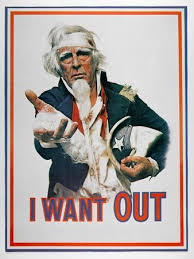
The method of the US top brass of conducting the war facilitated the interaction of the American people as a whole with ex-soldiers, some of them with war medals like Purple Hearts and others more highly decorated.

The rapid rotation between the ‘battle front’ and the ‘home front’ led to ‘fraternization’ between the army and the mass of the American people. Indeed, both ‘fronts’ in time became indistinguishable.
The U. S. was a scarified, splintered nation, it’s eye blackened deeply. The weeping wounds were moral ones; the war and three summers of deadly inner-city riots had inflicted them on the national soul, challenging Americans’ belief that they were a uniquely noble and honorable people. We saw news footage ‘in country’ from South Vietnam, such as the 1965 film of U. S. Marines setting fire to thatched huts in the village of Cam Ne with cigarette lighters and flamethrowers, and realized that they were capable of committing atrocities once considered the province of their enemies. We were treated to the sight of federal troops patrolling the streets of American cities. This showed the link, whether blacks deliberately made it or not—between the war abroad and poverty at home. We had to to ask ourselves how this could be happening in their City upon a Hill. And so the war went on, tearing at this country and increasingly at mine. The early anger turned to a sense of numbness. It would take a long bitter dose of Nixon rule until a government military planner Daniel Ellsberg leaking like a drover’s dog, made public papers that spilled the beans on those responsible, displaying their misdeeds in black and white : ‘a quarter century of aggression, broken treaties, deceptions, stolen elections, lies and murder. ’ All for what?
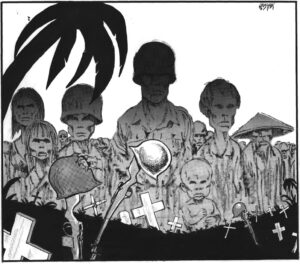
The papers revealed their action plan for the Republic of South Vietnam back in March 1965 :
70% –To avoid a humiliating US defeat.
20%–To keep the republic (and then adjacent) territory from Chinese hands.
10%–To permit the people of SVN to enjoy a better, freer way of life.
They killed so many thousands for their own egos.